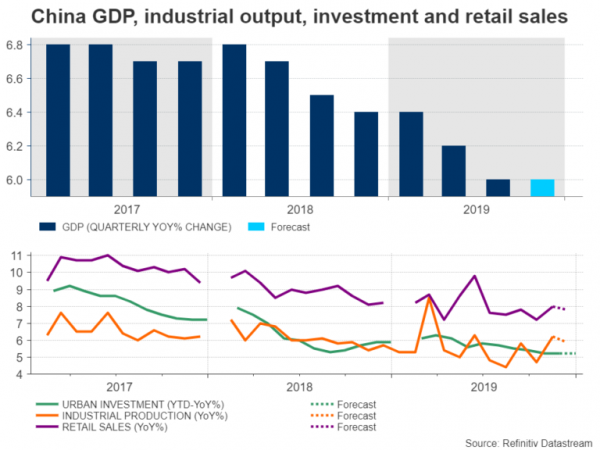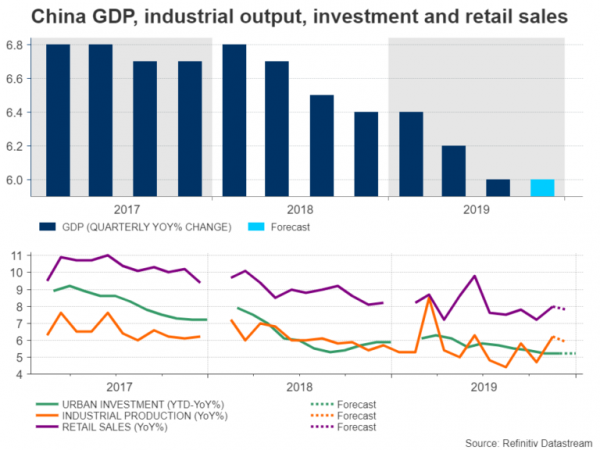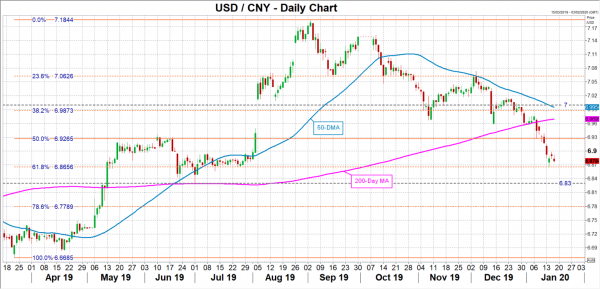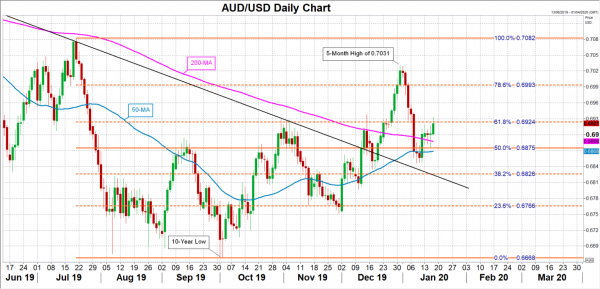China will report GDP numbers for the fourth quarter on Friday 02:00 GMT alongside industrial output and retail sales figures for December. After growth slowed to a three-decade low in the third quarter, will the optimism around the ‘phase one’ trade deal in the final three months of 2019 been enough to kick start the economy?
No rebound expected just yet
Economic growth in China has been steadily decelerating since 2010 and stood at just 6.0% year-on-year in the third quarter – a three-decade low. The fourth quarter is not expected to have produced any rebound and consensus forecasts are for the GDP growth rate to have been unchanged at 6.0%. If the market expectation is met, the steadier growth should at the very least raise hopes that the slowdown is bottoming out.
There was some support for this view from the trade data released earlier this week. Both exports and imports surged in December, signaling stronger demand both domestically and globally and a possible pickup in growth at the year end. Investors will therefore be watching the industrial output, retail sales and investment numbers that are also due on Friday for signs that growth is moving into faster gear.
However, analysts are not anticipating any rebound just yet. Industrial production is forecast to have increased by 5.9% y/y in December, slowing from the prior 6.2%, while investment in urban areas is expected to have maintained annual growth of 5.2% in the year-to-date to December. Retail sales are also projected to have moderated, from 6.2% to 5.9% y/y.
More room for the yuan to appreciate?
If the data beat the expectations, both the yuan and the Australian dollar – considered a liquid proxy for China’s economy – are likely to get a boost. The yuan has already appreciated sharply in January on the back of the ‘phase one’ Sino-US trade deal being reached. It hit the highest in nearly six months versus the US dollar on Tuesday and could next aim for the 6.83 per dollar level – a critical support barrier for dollar/yuan in June and July 2019.
The Australian dollar, meanwhile, could get the lift it needs to break above the 61.8% Fibonacci retracement level of the July-October downleg at $0.6924, which would reinforce the recovery from last October’s 10-year lows and turn the attention to the December top of $0.7031.
Risk of trade deal benefits being overestimated
There is a risk, however, that if Friday’s batch of data brings some negative surprises, it could provide a reality check for investors who may be overestimating the potential boost to Chinese and global growth from the phase one agreement. With only a handful of tariffs being reduced as part of the deal, there will be few benefits for Chinese exporters apart from a partial restoration in business confidence.
It’s also uncertain whether China will be able to fulfill its ambitious pledge of buying $200 billion worth of additional US goods and services within two years, risking irking the Americans and causing the deal to fall through if they fail to meet this key target.
Any worries arising about China’s economy from the data could see the yuan retreating as far back as the 7 per dollar level. The aussie could also be hit if there’s a broader effect on risk sentiment. A pull back towards the 38.2% Fibonacci at $0.6826 is possible if the trade optimism begins to wane.
On balance, however, the Q4 data is unlikely to be a game changer and most investors will prefer to wait for first quarter growth indicators before reassessing their outlook on China.





 Signal2forex.com - Best Forex robots and signals
Signal2forex.com - Best Forex robots and signals




